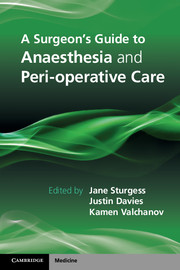Book contents
- Frontmatter
- Contents
- List of contributors
- Foreword
- Section I Basic sciences
- Section II Anaesthesia and peri-operative care for surgical specialties
- Chapter 7 Cardiothoracic cases
- Chapter 8 Colorectal cases
- Chapter 9 Upper gastrointestinal cases
- Chapter 10 Hepatobiliary and pancreatic cases
- Chapter 11 Endocrine cases
- Chapter 12 Vascular cases
- Chapter 13 Organ transplant cases
- Chapter 14 Otorhinology, head and neck cases
- Chapter 15 Paediatric cases
- Chapter 16 Plastic, reconstructive and cosmetic cases
- Chapter 17 Neurosurgery cases
- Chapter 18 Trauma cases
- Chapter 19 Orthopaedic cases
- Chapter 20 Urology cases
- Chapter 21 Bariatric cases
- Section III At a glance
- List of abbreviations
- Index
- References
Chapter 9 - Upper gastrointestinal cases
Published online by Cambridge University Press: 05 July 2014
- Frontmatter
- Contents
- List of contributors
- Foreword
- Section I Basic sciences
- Section II Anaesthesia and peri-operative care for surgical specialties
- Chapter 7 Cardiothoracic cases
- Chapter 8 Colorectal cases
- Chapter 9 Upper gastrointestinal cases
- Chapter 10 Hepatobiliary and pancreatic cases
- Chapter 11 Endocrine cases
- Chapter 12 Vascular cases
- Chapter 13 Organ transplant cases
- Chapter 14 Otorhinology, head and neck cases
- Chapter 15 Paediatric cases
- Chapter 16 Plastic, reconstructive and cosmetic cases
- Chapter 17 Neurosurgery cases
- Chapter 18 Trauma cases
- Chapter 19 Orthopaedic cases
- Chapter 20 Urology cases
- Chapter 21 Bariatric cases
- Section III At a glance
- List of abbreviations
- Index
- References
Summary
Introduction
The range of surgical procedures, the potential anatomical hazards, and the problems associated with patient co-morbidities make upper gastrointestinal surgery a stimulating specialty for surgeon and anaesthetist. In recent years, the near-universal move towards minimally invasive surgery and early ambulation have been mirrored in upper GI surgery, providing further challenges for the surgical team.
The cases demonstrated here are not meant to reflect the vast range of upper GI surgical procedures, but highlight particular anaesthetic challenges associated with this type of surgery. Case 1 discusses the anaesthetic management of laparoscopic surgery, with specific concerns relating to the management of analgesia and post-operative nausea and vomiting. Case 2 discusses upper GI surgery in the morbidly obese, an increasingly common problem for surgeons generally, particularly in the developed world, and especially relevant to the upper GI surgeon practising bariatric surgical techniques. The final case focuses on the management of the patient undergoing oesophagectomy, and discusses the practical management, physiology and evidence-based rationale for treatment; from pre-operative anaesthetic assessment of the patient to post-surgical care in the high-dependency or intensive care setting.
- Type
- Chapter
- Information
- A Surgeon's Guide to Anaesthesia and Peri-operative Care , pp. 102 - 115Publisher: Cambridge University PressPrint publication year: 2014



